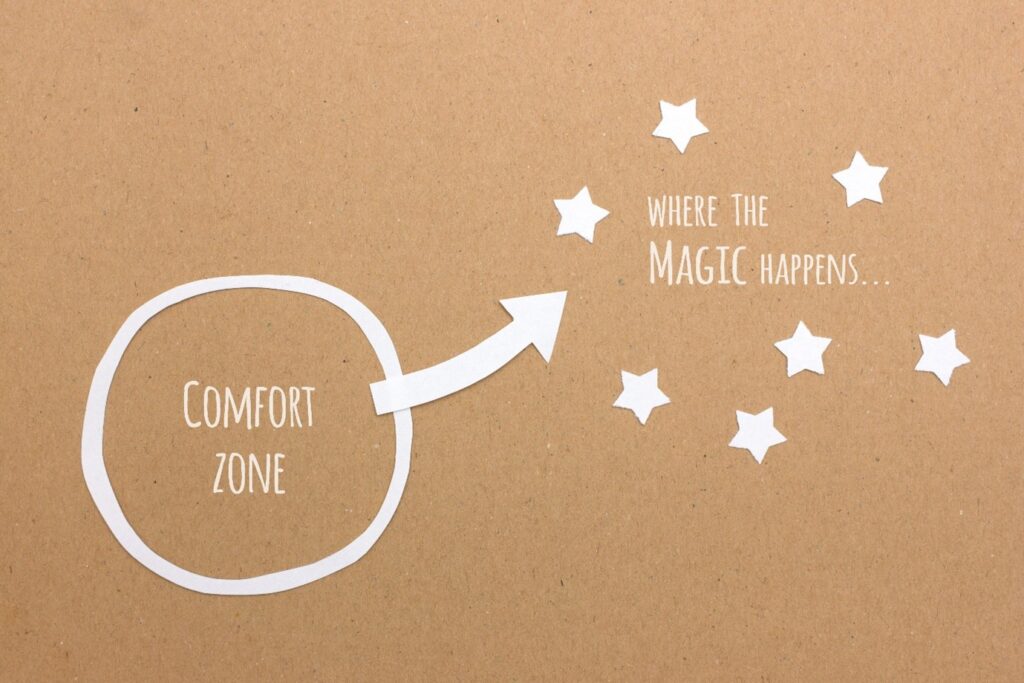[vc_row][vc_column][vc_column_text]We humans are all creatures of habit. That’s why we go to our favourite restaurant and end up ordering the same thing each time. Or we open the wardrobe and wear the same 20% of our clothes. We just know what works and don’t want to take the risk of being disappointed with the result.
COVID was the catalyst for shaking us all out of our familiar patterns and making us rethink our view of normal. Whilst some embraced the joy of working in our shorts and thongs, others took a while to adapt and mourned the loss of their normal routine. Partnerships are in a new era that demands a higher level of performance and a more transformative approach. Are you still stuck in your comfort zone with partnerships?
Your non-profit has an ambitious agenda for change that won’t be met by simply selling programs to corporate partners. This transactional approach means you’ll get stuck within your own four walls with small scale, small impact activities that don’t advance your mission meaningfully. If you want to achieve a transformational impact, there are two ways to effect change.
- Optimising the current system
- Leveraging all players to change the system
Optimising the current system involves finding synergies with the right corporate partners and working together to solve problems. You’ll need to help solve the corporate’s commercial problems and inspire them to work with you on the bigger societal challenges. Non-profits can typically offer expertise and deep understanding to a corporate partner. That enables both sides to scale up solutions and impact. When Save the Children Sweden worked with IKEA it was initially to advise on removing child labour from their production. The partnership had natural synergies in a common commitment to human rights and the welfare of children. It progressed to a deeper relationship that addressed the root causes of child labour, including poverty and lack of access to education. IKEA no longer has children involved in production, but they have a global program to support children’s education. They have worked within the current system to provide better solutions for each partner.
Changing the system involves going beyond a bilateral partnership to change the underlying dynamics of a major societal issue. It includes joint lobbying for the common good, rather than just problem solving. Tesco UK and World Wildlife Fund have a partnership that aims to reduce the environmental impact of the average shopping basket by half. The aims are bold and ambitious, but the partnership has gone even further. In order to accelerate and augment the environmental impact, Tesco and WWF have launched an accelerator program that pairs tech start-ups with key suppliers in its global supply chain. The approach will fast track sustainability innovation and reduce the environmental impact of food production at the farming stage, rather than merely reducing consumption. The partnership also extends to advocacy with the UK to provide more support for sustainability start-ups. If you want to change the system, then it’s likely that you’ll need to get government engaged at some point.
Tesco and WWF are stretching the boundaries of what can be achieved in a partnership between a corporate and a non-profit. Another approach is to work with in partnership with an entire sector. Alzheimer’s UK has created Insurance United Against Dementia, championed by the biggest leaders in the insurance industry. It aims to raise £10 million for support services and research into dementia. The movement will create significant savings for the insurance industry and make a transformational impact on an issue that affects 1 in 3 people in their lifetime.
You can either optimise the current system or work to change the system itself. Staying within your comfort zone is not an option. If you want to make a dent in some of society’s biggest issues, then it’s time to stop selling your programs to corporate partners and start having a bigger conversation about which issue you’re going to solve- together.[/vc_column_text][/vc_column][/vc_row][vc_row][vc_column][vc_column_text][activecampaign form=1 css=1][/vc_column_text][/vc_column][/vc_row]

